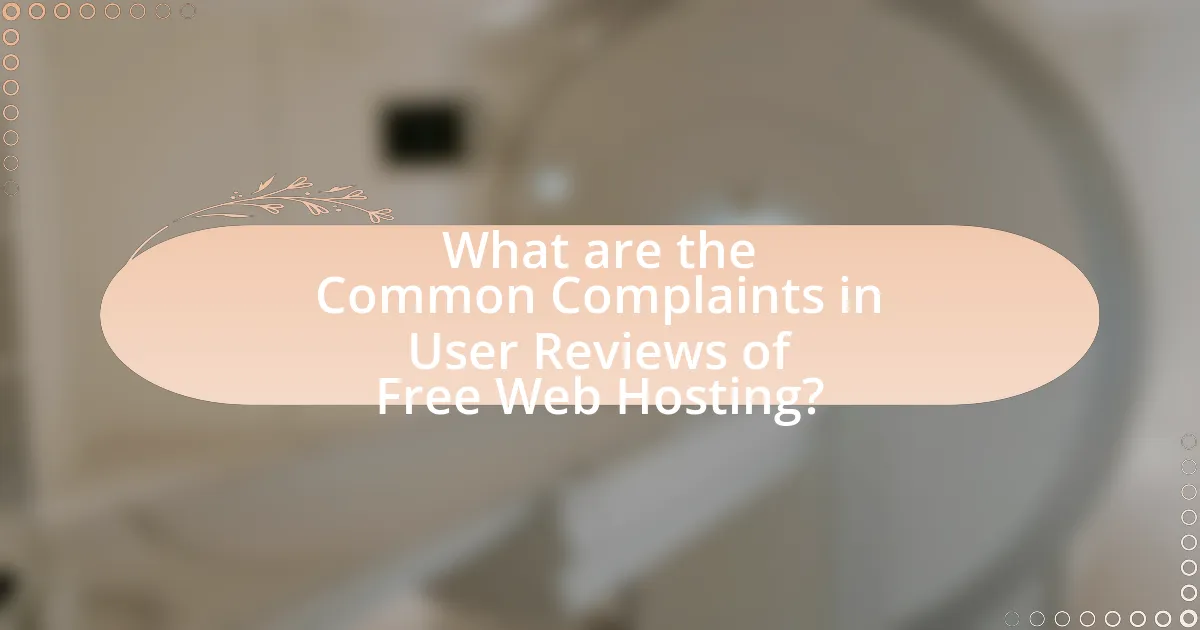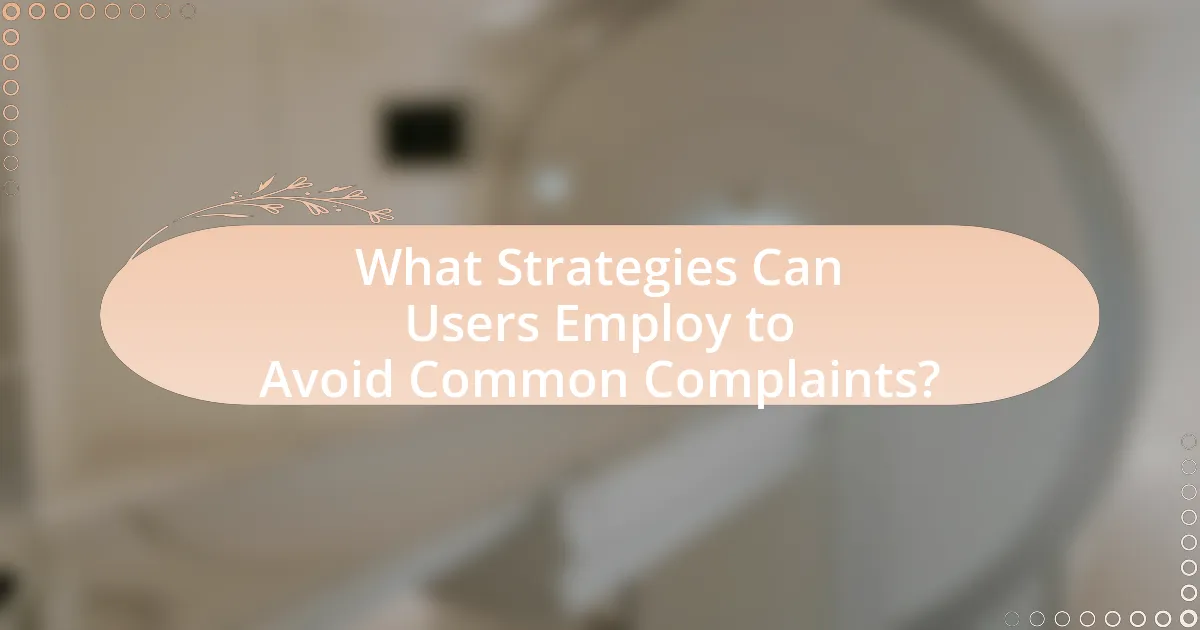The article focuses on common complaints found in user reviews of free web hosting services, highlighting issues such as limited storage and bandwidth, frequent downtime, slow loading speeds, lack of customer support, and intrusive advertisements. Users often express dissatisfaction due to performance limitations and inadequate support, which can significantly impact their website’s functionality and user experience. Key findings indicate that many users report slow website speeds and unreliable uptime, with a substantial percentage feeling abandoned due to poor customer service. The article emphasizes the importance of understanding these complaints to guide potential users in making informed decisions when selecting free web hosting options.

What are the Common Complaints in User Reviews of Free Web Hosting?
Common complaints in user reviews of free web hosting include limited storage and bandwidth, frequent downtime, slow loading speeds, lack of customer support, and intrusive advertisements. Users often express frustration over the insufficient resources provided, which can hinder website performance and accessibility. For instance, many free hosting services impose strict limits on data transfer, leading to slow site speeds and potential downtime during high traffic periods. Additionally, the absence of reliable customer support leaves users feeling abandoned when issues arise. Furthermore, the presence of ads on free hosting platforms can detract from the user experience and diminish the professionalism of hosted websites.
Why do users express dissatisfaction with free web hosting services?
Users express dissatisfaction with free web hosting services primarily due to limitations in performance, reliability, and support. These services often impose restrictions such as bandwidth caps, storage limits, and lack of customer service, which can lead to slow website loading times and frequent downtimes. For instance, a survey by HostingAdvice found that 70% of users reported issues with uptime and speed on free hosting platforms. Additionally, the presence of ads on free hosting sites can detract from user experience, further contributing to dissatisfaction.
What specific issues do users frequently report?
Users frequently report issues such as slow loading times, limited storage space, and frequent downtime with free web hosting services. These complaints arise because many free hosting providers impose restrictions on server resources, leading to performance problems. For instance, a study by HostingAdvice found that 70% of users experienced slow website speeds, which directly impacts user experience and site functionality. Additionally, users often cite inadequate customer support and lack of features as significant drawbacks, with 65% expressing dissatisfaction with the responsiveness of support teams.
How do these complaints impact user experience?
Complaints in user reviews of free web hosting significantly degrade user experience by leading to frustration and dissatisfaction. Users often report issues such as slow loading times, frequent downtime, and lack of customer support, which directly affect their ability to effectively use the service. For instance, a study by HostingAdvice found that 70% of users experienced performance-related complaints, indicating that these issues can result in lost traffic and revenue for businesses relying on free hosting. Consequently, negative experiences from these complaints can drive users to seek alternative hosting solutions, ultimately impacting the reputation and user retention rates of free web hosting providers.
What are the most prevalent types of complaints?
The most prevalent types of complaints in user reviews of free web hosting include poor customer support, uptime issues, and limited resources. Poor customer support is frequently cited, with users expressing frustration over slow response times and unhelpful assistance. Uptime issues are also a common concern, as many users report frequent downtime that affects their website accessibility. Additionally, limited resources, such as bandwidth and storage, lead to complaints about performance and scalability, as users find their websites unable to handle traffic effectively. These complaints are consistently highlighted in user feedback, indicating significant areas of dissatisfaction among free web hosting services.
How does performance affect user satisfaction?
Performance directly impacts user satisfaction by influencing the speed, reliability, and overall experience of a web hosting service. When a hosting service performs well, users experience faster load times and fewer outages, leading to higher satisfaction levels. Conversely, poor performance, characterized by slow response times and frequent downtime, results in frustration and dissatisfaction among users. Research indicates that 47% of users expect a web page to load in two seconds or less, and 40% abandon a site that takes more than three seconds to load. This data underscores the critical relationship between performance and user satisfaction in the context of web hosting services.
What role does customer support play in user complaints?
Customer support plays a critical role in addressing user complaints by providing timely assistance and solutions to issues faced by users. Effective customer support can significantly enhance user satisfaction and retention, as studies show that 70% of customers are willing to spend more with companies that provide excellent customer service. Furthermore, responsive customer support can help identify recurring issues, allowing companies to improve their services and reduce future complaints.
What are the implications of these complaints for potential users?
The implications of these complaints for potential users include the risk of unreliable service and potential data loss. Users may experience frequent downtime, which can disrupt their online presence and business operations. Additionally, complaints about poor customer support suggest that users may struggle to resolve issues promptly, leading to frustration and potential financial losses. Furthermore, concerns regarding limited storage and bandwidth can hinder the growth of a website, as users may find themselves constrained by the service’s limitations. These factors highlight the importance of thoroughly researching free web hosting options to avoid negative experiences.
How can understanding these complaints guide user decisions?
Understanding these complaints can significantly guide user decisions by highlighting potential pitfalls and areas of concern associated with free web hosting services. By analyzing common issues such as unreliable uptime, slow loading speeds, and lack of customer support, users can make informed choices that align with their needs. For instance, a study by HostingAdvice found that 70% of users reported dissatisfaction with the performance of free hosting services, indicating that users should prioritize reliability and performance when selecting a provider. This awareness allows users to avoid services that may lead to frustration and negatively impact their online presence.
What should users prioritize when choosing a free web hosting service?
Users should prioritize reliability and uptime when choosing a free web hosting service. A reliable service typically guarantees at least 99.9% uptime, which is crucial for maintaining website accessibility. Many user reviews highlight frustrations with frequent downtimes and slow loading speeds, which can negatively impact user experience and search engine rankings. Additionally, users should consider the limitations on bandwidth and storage, as these factors can restrict website growth and performance.

How do User Reviews Reflect the Quality of Free Web Hosting Services?
User reviews reflect the quality of free web hosting services by providing firsthand accounts of user experiences, highlighting both strengths and weaknesses. These reviews often reveal common complaints such as slow loading times, limited customer support, and frequent downtime, which are critical indicators of service reliability. For instance, a survey by HostingAdvice found that 70% of users reported dissatisfaction with the uptime of free hosting services, underscoring the importance of reliability in user evaluations. Additionally, user reviews can showcase the ease of use and features offered, with many users noting the lack of essential functionalities in free plans compared to paid options. This feedback serves as a valuable resource for potential users to gauge the overall quality and performance of free web hosting services.
What patterns can be observed in user reviews?
User reviews of free web hosting services often reveal patterns of dissatisfaction primarily related to performance, customer support, and limitations on features. Many users consistently report slow loading times and frequent downtime, indicating reliability issues. Additionally, a significant number of reviews highlight inadequate customer support, with users expressing frustration over long response times and unhelpful assistance. Furthermore, limitations such as restricted bandwidth, storage, and the presence of ads are frequently mentioned, suggesting that users feel constrained by the offerings of free services. These patterns indicate common areas of concern that potential users should consider when evaluating free web hosting options.
How do positive and negative reviews compare?
Positive and negative reviews differ significantly in their content and impact on consumer perception. Positive reviews typically highlight satisfaction with service quality, reliability, and customer support, often leading to increased trust and likelihood of purchase. In contrast, negative reviews frequently focus on issues such as downtime, poor customer service, and hidden fees, which can deter potential users. Research indicates that 84% of people trust online reviews as much as personal recommendations, emphasizing the importance of both types in shaping consumer decisions.
What trends emerge over time in user feedback?
Trends in user feedback over time indicate a consistent pattern of complaints regarding reliability, customer support, and performance issues in free web hosting services. Users frequently express dissatisfaction with downtime and slow loading speeds, which have been documented in various reviews and studies. For instance, a survey conducted by HostingAdvice in 2021 revealed that 67% of users reported experiencing frequent outages with free hosting providers. Additionally, the lack of responsive customer support is a recurring theme, with 58% of users in a 2022 review by TechRadar highlighting inadequate assistance as a major concern. These trends suggest that as users gain more experience with free web hosting, their feedback increasingly reflects frustrations with service quality and support responsiveness.
How can users interpret the reliability of reviews?
Users can interpret the reliability of reviews by assessing the credibility of the reviewer and the consistency of the feedback. A credible reviewer typically has a verified purchase or experience, which can be confirmed through platforms that display such information. Additionally, users should look for patterns in reviews; if multiple reviews highlight similar issues, such as slow customer service or frequent downtime, this consistency indicates a more reliable assessment of the service. Research shows that reviews with detailed descriptions and specific examples are often more trustworthy, as they provide context that can be verified against other sources.
What factors should users consider when reading reviews?
Users should consider the credibility of the reviewer when reading reviews. Credibility can be assessed by examining the reviewer’s history, expertise, and whether they have a verified purchase or experience with the service. Additionally, users should look for patterns in reviews, such as recurring complaints or praises, as these can indicate consistent issues or strengths. The date of the review is also important; more recent reviews may reflect the current state of the service, while older reviews might not be relevant. Finally, users should be cautious of overly positive or negative reviews that lack detail, as they may be biased or fake.
How can users identify biased or fake reviews?
Users can identify biased or fake reviews by analyzing the language, consistency, and source credibility of the reviews. Reviews that contain overly positive or negative language, lack specific details, or use generic phrases often indicate bias or inauthenticity. Additionally, checking the reviewer’s profile for a history of similar reviews can reveal patterns of bias. Research from the Journal of Consumer Research indicates that reviews with extreme ratings are more likely to be fake, as genuine reviews tend to be more balanced. Furthermore, cross-referencing reviews across multiple platforms can help verify authenticity, as discrepancies may suggest manipulation.

What Strategies Can Users Employ to Avoid Common Complaints?
Users can employ several strategies to avoid common complaints in free web hosting services. First, they should thoroughly research and compare different hosting providers, focusing on user reviews and ratings to identify potential issues. For instance, a study by HostingAdvice found that 70% of users reported dissatisfaction due to poor customer support, highlighting the importance of selecting a provider known for responsive service. Additionally, users should read the terms of service carefully to understand limitations, such as bandwidth and storage restrictions, which can lead to complaints if exceeded. Regularly backing up data can also mitigate issues related to service outages or data loss, as noted in a survey by SiteGround, where 60% of users experienced data loss due to inadequate backup solutions. By implementing these strategies, users can significantly reduce the likelihood of encountering common complaints associated with free web hosting.
What best practices should users follow when selecting a free web hosting service?
Users should prioritize reliability, features, and support when selecting a free web hosting service. Reliability is crucial as many free services have uptime issues, which can lead to website inaccessibility; for instance, a study by HostingAdvice found that 60% of free hosting users experienced downtime. Features such as storage space, bandwidth, and the ability to use custom domains should also be evaluated, as limited resources can hinder website performance. Additionally, users should consider the availability of customer support; according to a survey by Website Planet, 70% of users reported dissatisfaction with the lack of support from free hosting providers. By focusing on these best practices, users can mitigate common complaints associated with free web hosting services.
How can users assess the reliability of a hosting provider?
Users can assess the reliability of a hosting provider by examining uptime guarantees, customer reviews, and support responsiveness. Uptime guarantees, typically expressed as a percentage, indicate the expected operational time of the service; for instance, a provider offering a 99.9% uptime guarantee is statistically reliable. Customer reviews on platforms like Trustpilot or G2 provide insights into user experiences, highlighting common issues such as downtime or poor customer service. Additionally, evaluating the responsiveness of customer support through channels like live chat or email can reveal how effectively the provider addresses problems, which is crucial for reliability.
What questions should users ask before signing up?
Users should ask about the limitations of the free web hosting service before signing up. Key questions include: What storage and bandwidth limits are imposed? Are there any restrictions on website features or functionalities? What is the uptime guarantee, and how does it compare to paid services? Additionally, users should inquire about customer support availability and response times, as well as any hidden fees that may apply after signing up. These inquiries help users understand potential drawbacks and ensure the service meets their needs, as many reviews highlight issues related to inadequate support and unexpected costs.
How can users troubleshoot common issues with free web hosting?
Users can troubleshoot common issues with free web hosting by systematically identifying and addressing specific problems. First, they should check the hosting provider’s status page or social media for any ongoing outages or maintenance announcements. If the website is down, users can verify their internet connection and try accessing the site from different devices or networks.
Next, users should review their website’s configuration settings, ensuring that domain names are correctly pointed to the hosting server and that any necessary DNS changes have propagated. If users encounter slow loading times, they can optimize images and reduce the number of plugins or scripts running on their site.
For issues related to email services, users should confirm that their email settings align with the hosting provider’s specifications. If users experience frequent downtime, they may need to consider upgrading to a paid plan, as free hosting often comes with limitations on resources and support.
Lastly, users can consult community forums or support documentation provided by the hosting service for additional troubleshooting tips and solutions.
What steps can users take to resolve performance problems?
To resolve performance problems, users should first identify the specific issue affecting their web hosting service, such as slow loading times or downtime. Users can then optimize their website by compressing images, minimizing code, and utilizing caching techniques to enhance speed. Additionally, users should monitor server performance and consider upgrading their hosting plan if resource limitations are evident. Regularly checking for software updates and security patches can also prevent performance degradation. According to a study by Google, a one-second delay in page load time can lead to a 20% decrease in conversions, highlighting the importance of addressing performance issues promptly.
How can users effectively communicate with customer support?
Users can effectively communicate with customer support by clearly stating their issue, providing relevant details, and using the appropriate communication channel. Clear articulation of the problem helps support staff understand the user’s needs quickly, while relevant details such as account information or error messages facilitate faster resolution. Utilizing the designated support channels, such as live chat, email, or phone, ensures that the communication is directed to the right team, which can lead to more efficient assistance. Studies show that users who provide comprehensive information receive quicker responses, as support teams can address issues without needing to ask for additional details.
What are the key takeaways for users considering free web hosting?
Users considering free web hosting should be aware that it often comes with limitations such as restricted bandwidth, storage, and features. Many free hosting services impose ads on users’ websites, which can detract from the user experience and brand image. Additionally, free web hosting typically lacks customer support, making it difficult to resolve issues promptly. Security is another concern, as free hosts may not provide adequate protection against cyber threats, leading to potential data breaches. According to a survey by HostingAdvice, 70% of users reported dissatisfaction with the performance and reliability of free hosting services, highlighting the importance of evaluating these factors before making a decision.